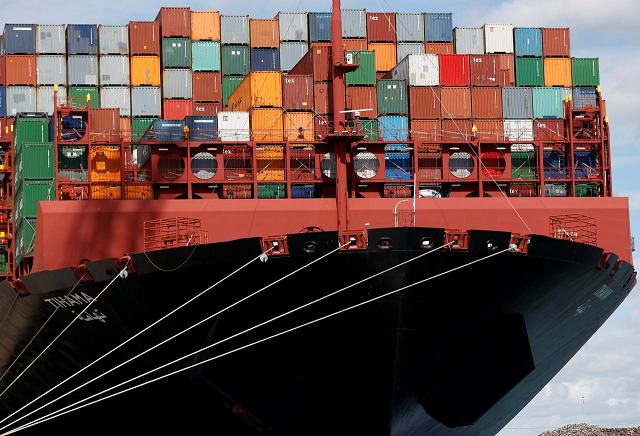Central Asia a good avenue for widening Pakistan’s export base
This market has never been exploited fully; country can cash in on the opportunity

This market has never been exploited fully; country can cash in on the opportunity.
PHOTO: REUTERS
It maintained double-digit GDP growth for years and continued to transform the economic outlook. China adopted the slogan of ‘go global’ and opened its economy for pro-active engagements. It led to a change in the policy of non-interference and the country went for constructive engagement.
This slogan became the loudest during the tenure of the current leadership. President Xi Jinping started developing new ideas and looked for new ways of engagement. The Belt and Road Initiative (BRI) is the culmination of his transformative thoughts.
Pakistan ranked 8th in size of trade deficit
BRI is a comprehensive programme which covers almost all aspects. China claims that it is constructive engagement in order to share benefits of economic development.
However, the biggest challenge is the peaceful implementation of the programme. Many countries have opposed the initiative on the assumption that China has an agenda to challenge the existing system.
Realising the threat, China is taking keen interest in constructive engagements at political, diplomatic and security levels.
The Heart of Asia (HoA) is one such initiative whereby China is playing a very prominent and active role. The initiative, which started in November 2011, has been shaped to cater to the needs of participating and supporting countries and organisations. HoA has taken a number of initiatives to tackle economic and security matters along with diplomatic and political issues. Participating countries are actively pursuing the shared agenda.
However, the core agenda is a peaceful and prosperous Afghanistan. Therefore, a permanent secretariat is being established at the foreign office in Afghanistan.
China says US trying to force it to submit on trade as new tariffs kick in
Confidence building
HoA has launched six confidence-building measures (CBMs) to tackle the most urgent and important issues. The CBMs include counter-terrorism, counter-narcotics, disaster management, education, trade commerce and investment, and regional infrastructure. Now, a new CBM has been undertaken to address food security and agricultural challenges.
These CBMs are playing a very constructive role in bringing together the participating countries. However, all participating countries must understand that their efforts must be beyond geopolitical interests.
However, many countries have competing geopolitical goals like Iran and Saudi Arabia, Pakistan and India, etc. These countries will have to keep their geopolitical interests aside and focus on the objective of CBMs and HoA.
In this backdrop, China is pushing all the participating countries to play a more active role to achieve the objectives of HoA. China views this as a vital initiative for successful implementation of BRI projects in participating countries and others to ensure shared prosperity.
China also believes that sustained economic growth and development is the best way to tackle conflicts. Therefore, it is trying to facilitate rapid economic development in the participating countries of HoA along with other initiatives. Special focus is on Afghanistan as it is suffering more from the conflict.
A successful implementation of the HoA initiative and China’s efforts for peaceful Afghanistan will provide new opportunities for all countries, specifically for the expansion of the CPEC under the BRI.
Economic zones
It is need of the hour to expand the export base of Pakistan and import much-needed energy resources. Pakistan has started working on the second phase of CPEC and the main element of this phase is the development of Special Economic Zones (SEZs).
SEZs will give a boost to national production in different sectors. Pakistan will have to look for competitive markets for exports. Central Asian states present a good avenue for widening the export base. This market has never been exploited fully but now Pakistan has to frame a policy to cash in on the opportunity.
A successful implementation of CPEC’s second phase will lead to an increase in Pakistan’s trade volume. It is better to make efforts immediately.
However, to forge links with the Central Asian states, a stable and peaceful Afghanistan is a must. Peace in Afghanistan will determine the prospects of connectivity with Central Asia. Pakistan is already putting in all efforts to support the peace process in Afghanistan. Pakistan has also accommodated a huge number of Afghan refugees and invested a lot of resources. Pakistan provided them education, health and other facilities.
Pakistan now wants a respectable return of Afghan refugees. It has been urging Kabul to accelerate its efforts for promoting internal peace and security.
Afghanistan should understand that only peace can bring economic and livelihood opportunities. The CPEC connectivity dream can only come true in the presence of a peaceful Afghanistan. CPEC will provide the required boost to the country’s economy. It provides an excellent opportunity for Afghanistan to connect with the region and beyond.
The writer is chief operating officer at Zalmi Foundation
Published in The Express Tribune, October 29th, 2018.
Like Business on Facebook, follow @TribuneBiz on Twitter to stay informed and join in the conversation.



















COMMENTS
Comments are moderated and generally will be posted if they are on-topic and not abusive.
For more information, please see our Comments FAQ